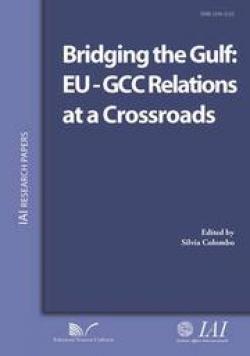Bridging the Gulf: EU-GCC Relations at a Crossroads
Le relazioni tra l'Unione europea (Ue) e il Consiglio di cooperazione del Golfo (Ccg) sono a un bivio. Dopo il fallimento dei negoziati per l'accordo di libero scambio nel 2008, la collaborazione tra i due blocchi regionali è rimasta di basso profilo in numerosi settori, mentre i cambiamenti senza precedenti in Nord Africa e Medio Oriente - il vicinato comune a Ue e Ccg - non hanno portato ad una rinnovata e strutturata cooperazione nelle questioni di politica estera e di sicurezza. Questo volume discute carenze e potenzialità delle relazioni Ue-Ccg valutandone il passato sviluppo e offrendo alcune raccomandazioni politiche su come rinnovare questa cooperazione strategica. In quest'ottica, evidenzia i settori in cui esiste maggior margine di manovra per un rafforzamento delle relazioni Ue-Ccg, esamina gli strumenti a disposizione e mette in luce la funzione svolta dal contesto regionale e internazionale, suscettibili entrambi di influenzare in modo significativo una nuova fase nella relazione reciproca tra i due blocchi regionali. Il volume è il risultato della ricerca condotta nell'ambito del progetto 'Sharaka - Enhancing Understanding and Cooperation in EU-GCC Relations' co-finanziato dalla Commissione europea.
Versione rivista e aggiornata dei rapporti pubblicati nella collana Sharaka Research Papers, prodotti nell'ambito del progetto 'Sharaka - Enhancing Understanding and Cooperation in EU-GCC Relations', co-finanziato dalla Commissione europea.
-
Dati bibliografici
Roma, Nuova Cultura, marzo 2014, 357 p. -
Numero
14 -
ISBN/ISSN/DOI:
978-88-6812-284-3
List of authors, p. 7-8
List of abbreviations, p. 9-13
Foreword, Silvia Colombo, p. 15-18
1. Need to Rethink the EU-GCC Strategic Relation,
Silvia Colombo and Camilla Committeri, p. 19-45
Introduction
1.1. The EU-GCC Cooperation between Strategic Interests and Ideational Obstacles
1.2. Sectoral Cooperation: the present state and the way forward
1.3. Challenges and Opportunities to Revamping EU-GCC Relations
2. EU-GCC Trade and Investment Relations: What Prospect of an FTA between the Two Regions?,
Rym Ayadi and Salim Gadi, p. 47-88
2.1. Creation of the GCC and its Relations with the EU
2.2. Trade and Investment Patterns Between the EU and the GCC: What Diagnosis?
2.3. The EU-GCC FTA: Motivations and Expected Impact
2.4. Prospects and Recommendations for Improving EU-GCC Trade and Investment Relations
Conclusion
3. Banking and Insurance in the GCC Countries: Is there Regulatory Convergence with the EU?,
Rym Ayadi and Willem Pieter de Groen, p. 89-156
Introduction
3.1. Banking Structure and Regulation in the EU and the GCC: What Degree of Convergence?
3.2. Overview of the Structure and Regulation of the Insurance Sector in the GCC Countries
Conclusion
4. EU-GCC Cooperation on Energy,
Abdulaziz Al-Shalabi, Nicolas Cottret and Emanuela Menichetti, p. 157-222
Introduction
4.1. Overview of the energy sector in the GCC
4.2. Identification of hot spots and implications for EU-GCC cooperation
Conclusion
5. Maritime Security: Challenges and Opportunities for EU-GCC Cooperation,
Natalino Ronzitti, p. 223-249
Introduction
5.1. The Regulatory Framework of Maritime Security
5.2. Bringing Terrorists to Justice: National/International/Hybrid Tribunals
5.3. NW/WMD Free Zones: Maritime Issues
5.4. Confidence and Security Building Measures (CSBMs) and Maritime Security
5.5. Enclosed and Semi-Enclosed Seas and the Persian Gulf
5.6. Maritime-Territorial Controversies
5.7. The Delimitation of Sea Areas
5.8. Piracy
5.9. Drug Trafficking and Trafficking in Persons
5.10. Marine Pollution
Conclusion
6. EU-GCC Cooperation in the Fields of Higher Education and Scientific Research: The Way Forward,
Ahmed Ali M. Al-Mukhaini, p. 251-273
Introduction
6.1. Status Quo
6.2. Top HE Destinations for GCC
6.3. Tertiary Education in the GCC and EU
6.4. Areas of Joint Scientific Research
6.5. Higher Education and Scientific Research in the EU-GCC Jap and Related Activities
6.6. Challenges to EU-GCC Cooperation in HESR
6.7. Why Focus on Higher Education and Scientific Research Now? Some Turning Points
6.8. Policy Recommendations
7. The Role of Mass Media in Building Perceptions of EU-GCC Relations and Related Impacts,
Fatma Al-Araimi and Cinzia Bianco, p. 275-291
Introduction
7.1. Contextualising EU-GCC Relations and the Role of the Media
7.2. The Voice of the Media
Conclusion
Policy Recommendations
Annexes, p. 293-334
Bibliography, p. 335-357
Tema
Tag
Contenuti collegati
-
Ricerca27/12/2013
SHARAKA - Enhancing Understanding and Cooperation in EU-GCC Relations
leggi tutto




